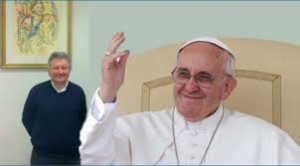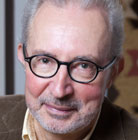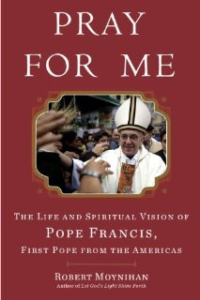July 20, 2013, Saturday — Who is with Pope Francis?
“Some believed it to be their duty to tell the Pope the truth. Certain that he would make the consequent decisions….” –Vatican journalist Sandro Magister, at the end of an explosive July 18 article in Italy which details allegations again Monsignor Battista Ricca, the Pope’s recent (June 15) choice to head up the Vatican’s bank (the IOR), of “scandalous” homosexual conduct 13 years ago in Montevideo, Uruguay, while serving in the Vatican’s nunciature there; Ricca has also been for more than a year the director of the Domus Santa Marta, where the Pope is living, which brings him into regular contact with the Pope, who sometimes takes him meals with Ricca at the same table
“Quanto affermato su monsignor Ricca non è attendibile.” (“What has been affirmed about Monsignor Ricca is not trustworthy.”) –Father Federico Lombardi, head of the Vatican Press Office, July 18, 2013, on the allegations made by Sandro Magister in his article released on the internet that same morning
“Povero padre Lombardi, che cosa gli tocca dire.” (“Poor Father Lombardi, the things he has to say.”) –Response of Sandro Magister and l’Espresso magazine to Father Lombardi’s statement that Magister’s report was not trustworthy, July 19, 2013; the journalist and magazine went on to say they stood by the story as printed
“To Father Lombardi, who defines as ‘not trustworthy’ what was published regarding Msgr. Ricca, L’Espresso replies reaffirming point by point the facts referred by Sandro Magister in his piece, confirmed by several primary sources and, as a whole, considered at the time of such gravity by the same Vatican authorities that forced them to remove the Monsignor from the Uruguay nunciature, in which he rendered his service, giving scandal to bishops,priests, religious and lay persons in that country.” –Part of the L’Espresso comment on Father Lombardi’s denial of the trutworthiness of the Magister reconstruction of the Monsignor Ricca case, July 19, 2013
“The Pope has had the chance to verify whether the accusations against Msgr. Ricca were consistent or not… Pope Francis is aware of the accusations made against Msgr. Ricca but has decided to keep him in his position.” –Father Lombardi, later on July 19, 2013
“Disinformation is intentionally false or inaccurate information that is spread deliberately. For this reason, it is synonymous with and sometimes called black propaganda… Disinformation is designed to manipulate the audience at the rational level by either discrediting conflicting information or supporting false conclusions. A common disinformation tactic is to mix some truth and observation with false conclusions and lies, or to reveal part of the truth while presenting it as the whole (a ‘limited hangout’)… Disinformation may include distribution of forged documents, manuscripts, and photographs, or spreading malicious rumors.” –-Wikipedia, article entitled “Disinformation”
The first crisis of the pontificate?
What a confusing, disturbing story has emerged in the past three days in Rome!
The conflicting facts and interpretations are causing those who love the Church and who are praying for Pope Francis to lead the Church in the right direction much pain… and those who are pleased when the Church’s moral authority is diminished a certain amused satisfaction…
By now most of you reading this will have heard of the disturbing allegations of homosexual activity being made against the Pope’s choice to be the prelate, or his personal representative, at the Vatican’s controversial bank, the IOR: Monsignor Battista Ricca.
 Ricca, a 57-year-old Italian prelate (shown here in the background as Pope Francis lifts his hand in greeting), is a career Vatican diplomat who in recent years has directed the three main guest houses for priests in Rome, and, notably, in the past year, the Domus Santa Marta, where the Pope is now living. In his post at the Secretariat of State, Ricca was in charge of accounting for all financial expenditures in all the nunciatures of the world. So he has a certain competence in economic matters.
Ricca, a 57-year-old Italian prelate (shown here in the background as Pope Francis lifts his hand in greeting), is a career Vatican diplomat who in recent years has directed the three main guest houses for priests in Rome, and, notably, in the past year, the Domus Santa Marta, where the Pope is now living. In his post at the Secretariat of State, Ricca was in charge of accounting for all financial expenditures in all the nunciatures of the world. So he has a certain competence in economic matters.
His staff confirm that he is a considerate, thoughtful man. I myself, during recent stays in the Domus, have spoken with him several times, and he has spoken eloquently of the need for Christians to live out the Christian faith, especially through acts of charity toward the poor and needy.
During these years, Ricca got to know Cardinal Jorge Bergoglio, now Pope Francis. Bergoglio from time to time would visit Rome and stay in the Casa del Clero on the via della Scrofa, near Piazza Navona. During those visits, Bergoglio came not only to know Ricca, but to trust him.
When Bergoglio became Pope, and decided to remain in the Domus Santa Marta, he turned to Ricca, with whom he often took his meals at the great central table in the dining room, to help him in his work of cleaning up and reforming the Roman Curia, one of the main things the cardinals asked for in the days leading up to the conclave.
On June 15, the Pope named Ricca to perhaps the key post in the overall effort to reform the curia: his personal representative at the Vatican bank, to oversee every aspect of the managment and reform of the bank.
Since the Vatican bank is a very important “nodal point” for the Curia and for the Church, the Pope’s decision to appoint Ricca as his “eyes and ears” at the bank immediately made Ricca much more important than he had ever been before, and a potential target of those who might wish that something up until now hidden at the Vatican bank might not come to light.
In other words, if there were any “weak points” in Ricca’s personal or professional past that could be used either to condition, control, or discredit him, his appointment might have made it urgent (to some) to discover those “weak points,” and then make use of them.
 Within 20 days of Ricca’s appointment, on July 3, an article by veteran Vatican journalist Sandro Magister (photo), a Catholic with a license in theology who once spent two years as a seminarian, appeared, saying that there was evidence that Ricca had engaged in “scandalous behavior” while in the nunciature in Montevideo, Uruguay, in 2000 and 2001, 13 and 12 years ago.
Within 20 days of Ricca’s appointment, on July 3, an article by veteran Vatican journalist Sandro Magister (photo), a Catholic with a license in theology who once spent two years as a seminarian, appeared, saying that there was evidence that Ricca had engaged in “scandalous behavior” while in the nunciature in Montevideo, Uruguay, in 2000 and 2001, 13 and 12 years ago.
In that first article by Magister, there were no specifics given. (Link: https://chiesa.espresso.repubblica.it/articolo/1350551)
At the time, all Vatican observers thought the article was important, and also rather odd, since it seemed a public “warning” to the Pope. I wondered at the time why the report, without citing any names of course, had been published as a news story, since there was no verifiable news in it. In other words, no one reading that first story could know whether what it was saying was true or not.
It is not entirely clear what happened next. We know that just a few days later, the nuncios from around the world were called to Rome to meet with the Pope, and it has been reported that more than one of the nuncios used the occasion to speak against Ricca to the Pope. It has been reported that the Pope then asked for biographical material on Ricca, studied it, and concluded that the accusations were either unfounded, exaggerated, or no longer relevant to Ricca’s present role.

But once again, the Pope was not moved. He authorized Father Lombardi to deny the allegations, saying that Magister’s report was “not trustworthy,” and he did not ask for Ricca’s immediate resignation.
So now the world is wondering: what is the truth?
Why are these allegations emerging now, instead of (for example) when the Pope decided to stay in the Domus, directed by Ricca?
Why is the Pope not asking for Ricca’s resignation, removing even the suspicion of scandal from the initial efforts of his pontificate to reform the Roman Curia?
The answers are not clear.
But one thing is clear: we are now at a critical juncture in the new pontificate of Pope Francis, elected on March 13 this year, a little more than 4 months ago.
This unusual, very human Pope has won the affection of the faithful, and he has enjoyed an almost incredible period of “pax mediatica” (“media peace”), as even the secular press, often hostile to the Church, has praised and celebrated his words and actions.
Now, on the eve of the Pope’s departure on Monday, July 22, for World Youth Day in Brazil, where more than 1 million young people are expected to gather to meet Francis, listen to his preaching, pray with him, and join him in celebrating Holy Mass, charges and denials are flying in Rome.
So what should we keep in mind at this juncture?
Three things:
1) Look behind the facts. I have been a Vaticanist for a quarter century. In those years, I have seen many cases when what seems to be true at first glance is not the truth, or not the whole truth. There is information, and there is disnformation. There are maneuvers to gain influence or to ward off change. This can even include discrediting a person with false charges. We must be very attentive to weigh all evidence and to ask: Is it true? Who provided the evidence? For what purpose or goal? Why now? And, could the facts have a more innocent explanation than appears at first glance? In short, we have to be cautious, and careful, and fair.
2) Fallen human nature and due process in the Church. Human beings are weak, and sinful — “mysterium iniquitatis” (“the mystery of iniquity”) and “errare humanum est” (“to err is human”)… so weak and sinful that even the apostles who spent three years with Jesus denied him… so weak that even the Israelites who crossed the Red Sea on dry land were within a brief time building a Golden Calf to worship… so weak that, as St. Paul said, “what I do not wish to do, I do, and what I wish to do, I do not do”… so that it is possible that a Vatican monsignor, like a Protestant minister, or a Jewish rabbi, or secular US government official, may commit sins. But there is also such a thing as due process. There is also the right to defend oneself, even from allegations that seem very grave. It would be a tragedy if the Church were to do anything to harm the long tradition, so important for human dignity, which says that every man has a right to his reputation, and to defend it, to explain seemingly damning facts, and also to repent of and foreswear sinful behavior.
A reform of the Curia must not become a which-hunt; that would be diabolical; a reform of the Curia must be carried out in a Christian way, and according to canon law. The ends do not justify the means. The law is a great protection for erring human beings; let us not be parties to a public lynching. Let us not leap to judgment, above all when the Pope himself has not done so.
3) The promise. The Church has been promised, and believes the promise, that Jesus Christ will always be with the Church, and that “the gates of hell will not prevail against her.” As a consequence, we can face any scandal, and weakness, and not lose heart, focusing on Christ, and his suffering, and resurrection, in which the definitive victory has already been won. So that even this scandal, if it is a scandal (and there could be more than one scandal hidden within these allegations and counter-allegations) should not disturb the serenity and confidence of our faith; Christ has conquered sin, and death. This is our hope, and the reason for our joy.
4) Pope Francis. No Pope is protected from prudential errors. But the successor of Peter is the leader of the Church. Francis now, more than ever, needs the support of Catholics, even those who have left the Church, to carry out his mission to a fallen, post-Christian, increasingly anti-Christian world. So all Catholics should do what Pope Francis has specifically asked them to do: Pray for him. Hold him up in prayer. Ask God to protect and guide Francis, as he walks among many “wolves”… the wolves spoken of by Emeritus Pope Benedict in his inaugural sermon on April 24, 2005… wolves, sometimes in sheep’s clothing, even inside of the Church, but also wolves outside of the Church, who desire the weakness and shame of the Church, in order to implement a vision of reality which in the end leads inevitably to human misery, and not the blessedness offered, and obtained, through the triumph of the crucified carpenter, under the Romans, now almost 2,000 years ago…
So, patience, and steadiness, and solidarity with Francis…
The Magister article which details the accusations
Brief excerpts and a link to the full story.
The Prelate of the Gay Lobby
Facts and personages of the scandalous past of the man whom Francis, unaware, delegated to represent him at the IOR. Here’s how a parallel power lives and thrives at the Vatican, plotting to the harm of the pope
by Sandro Magister
ROME, July 18, 2013 – “In the curia there is talk of a ‘gay lobby.’ And it is true, it’s there. Let’s see what we can do,” Francis said on June 6 to Latin American religious received in audience….
In effect, some of these ‘bosses’ have hatched against Jorge Mario Bergoglio the cruelest and most subtle deception since he was elected pope.
They kept in the dark important information that, if he had known it before, would have kept him from appointing Monsignor Battista Ricca “prelate” of the Institute for Works of Religion…
Before the appointment, Francis had been shown, as is customary, the personal file on Ricca, in which he had not found anything unseemly. He had also heard from various personalities of the curia, and none of them had raised objections.
Just one week after appointing the “prelate,” however, during the same days in which he was meeting with the apostolic nuncios who had come to Rome from all over the world, the pope became aware, from multiple sources, of some episodes from Ricca’s past previously unknown to him and such as to bring serious harm to the pope himself and to his intention of reform…
Because of the many upright persons who knew about his scandalous past, the news of the promotion was a cause of extreme bitterness, all the more keen because it was seen as a presage of harm for the arduous enterprise that Pope Francis has in the works, of purification of the Church and of reform of the Roman curia.
Because of this some believed it to be their duty to tell the pope the truth. Certain that he would make the consequent decisions.
Link to the complete article: https://chiesa.espresso.repubblica.it/articolo/1350561?eng=y
New Foundation
Editor’s Note: I wanted to thank the “Founding Members” of our new “Urbi et Orbi Foundation,” who have contributed more than $100,000 since Christmas to help us launch this initiative, aimed at working to improve relations between Catholics and Orthodox. We will be announcing our first projects and grants in a few days. We do seek further support. If anyone would like more information about this important initiative, please write to me by replying to this email. –Robert Moynihan
Please Consider Purchasing, or Giving as a Gift, My New Book on Pope Francis
 Entitled Pray for Me: The Life and Spiritual Vision of Pope Francis, First Pope from the Americas, my new book on Pope Francis was released on April 30 by Random House.
Entitled Pray for Me: The Life and Spiritual Vision of Pope Francis, First Pope from the Americas, my new book on Pope Francis was released on April 30 by Random House.
Pray for Me is geared toward those who would like to accompany Pope Francis on his journey of faith in the months and years ahead.
Here are links where you can order the book:
1. Amazon
If you would like a signed copy of the book, please call our toll-free number at 1-800-789-9494 in the US. Signed copies will be $30 (all shipping and handling included).
Please consider ordering this book if you enjoy this newsletter. It would be much appreciated.
“Think nothing else but that God ordains all, and where there is no love, put love, and you will draw love out.” –St. John of the Cross







Facebook Comments